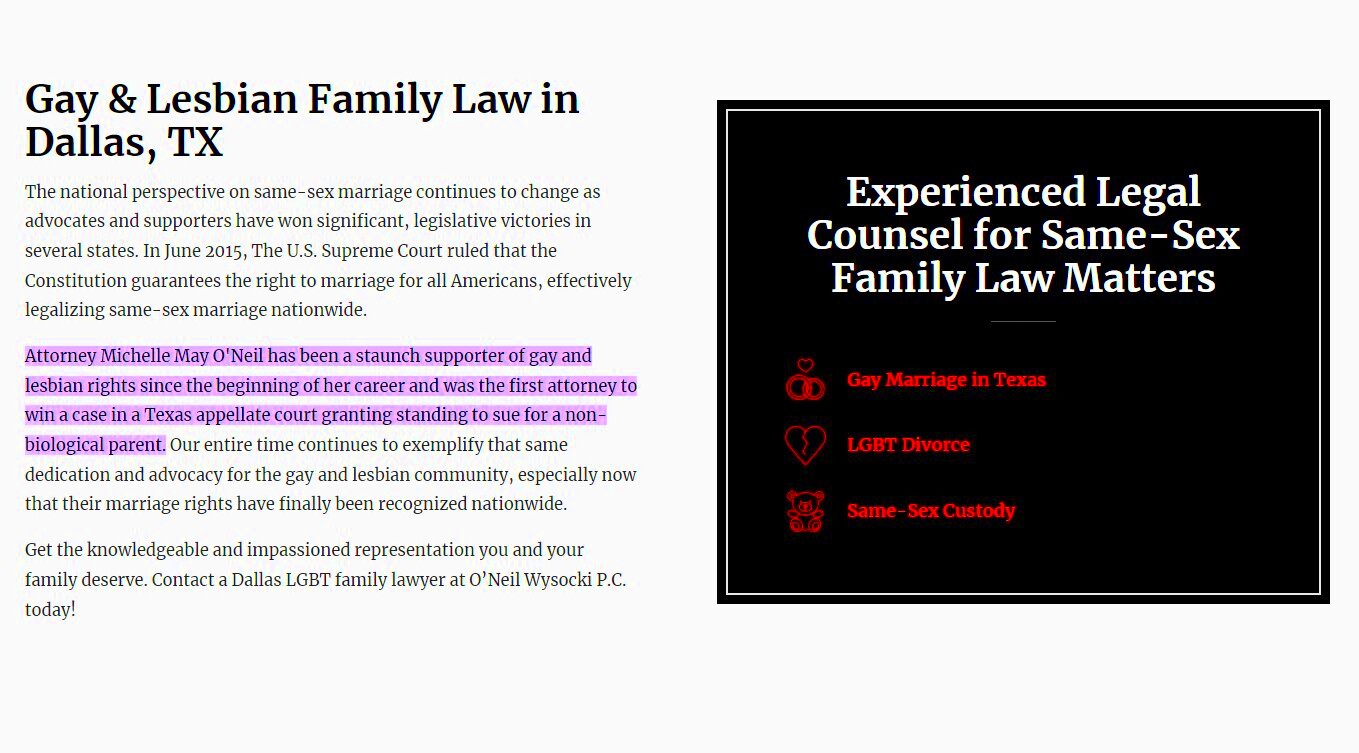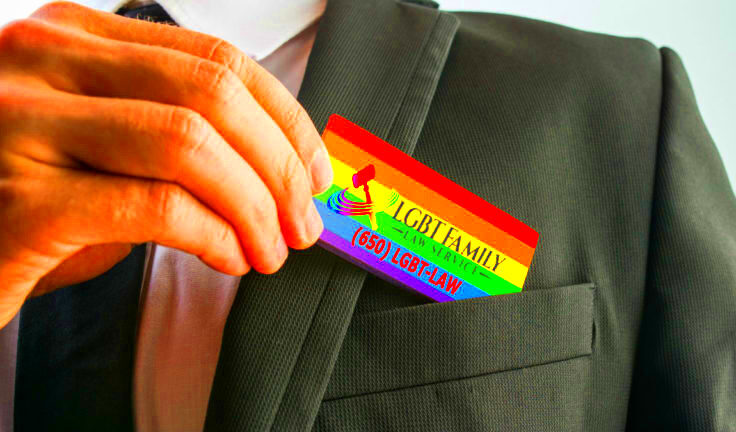LGBT Family Law Attorneys in Dallas
The realm of family law is intricate and laden with emotions, especially for LGBT families where the complexities deepen further. The legal hurdles encountered by LGBT families are distinct and often demand expertise. It’s vital to have a lawyer who grasps these subtleties to safeguard your families rights and wellbeing. From handling marriage and adoption matters to custody issues LGBT family law provides a support network designed to cater to various family dynamics. This article seeks to highlight these key elements and assist you in navigating the journey of securing legal assistance.
Understanding LGBT Family Law in Dallas

LGBT family law in Dallas covers a variety of matters that impact couples and families. It goes beyond just recognizing marriage equality to address adoption rights, custody battles and property division. The legal framework in Dallas aims to uphold the same rights and safeguards for LGBT families as it does for heterosexual ones. However the interpretation of these laws can be ambiguous or inconsistent at times, making it crucial to have a lawyer well versed in the nuances of this field.
For example Texas lacks statewide safeguards for the LGBT community in areas such as job discrimination although federal regulations do provide certain protections. In terms of family issues same sex couples might encounter obstacles concerning custody rights or the official acknowledgment of their partnership. Being aware of these subtleties can greatly impact your ability to navigate legal situations with efficiency.
Key Legal Issues for LGBT Families
LGBTQ families face unique challenges that necessitate thoughtful attention and professional support. Here are some of the crucial aspects to consider.
- Marriage and Partnership Recognition: Ensuring your relationship is legally recognized can be crucial for matters like inheritance and healthcare decisions.
- Adoption Rights: The process of adopting a child can differ for LGBT couples, depending on whether the state recognizes both partners as legal parents.
- Custody Disputes: If a relationship ends, determining custody and visitation rights can be particularly complex for LGBT parents.
- Property and Financial Rights: Dividing assets and debts fairly requires careful planning, especially if the legal recognition of your relationship is contested.
- Healthcare and End-of-Life Decisions: Legal documentation like wills and powers of attorney need to reflect your family’s needs to ensure that decisions are made in accordance with your wishes.
These matters often entail complexities in terms of legal reasoning and documentation. I recall assisting a pair dealing with difficulties regarding adoption rights. Their path included several court sessions and significant emotional strain. However with proper guidance they managed to overcome these obstacles, highlighting the significance of having well informed assistance during such times.
Rights and Protections for LGBT Families
Over the years LGBT families have made significant progress in obtaining legal rights and safeguards. In Dallas these rights are based on both state and federal laws similar to many other places. However maneuvering through this legal terrain can still be tricky. Its crucial to recognize that although marriage equality is now a reality other facets of LGBT family life like adoption and custody come with their own challenges.
For example the Supreme Courts decisions provide federal safeguards for marriage equality and protection against discrimination in the workplace. However there could be some shortcomings regarding matters such as housing or certain healthcare entitlements. Being aware of your rights can equip you to navigate potential legal challenges more efficiently.
Let me share a story about a family I assisted in their struggle for a partners adoption rights. Even though their marriage was recognized federally they faced obstacles in local courts because their state did not have protections for second parent adoption. With determination and legal assistance they achieved a result showcasing the significance of being knowledgeable and ready.
Key Protections Include:
- Marriage Equality: Federal law guarantees the right to marry and benefits associated with marriage.
- Adoption Rights: Legal recognition of parental rights, though it can vary by state and local jurisdictions.
- Non-Discrimination Protections: Federal protections against employment discrimination and, in some cases, housing discrimination.
- Healthcare Decision-Making: Rights to make medical decisions for a partner or spouse in emergencies.
How to Choose an LGBT Family Law Attorney
Choosing the attorney can greatly impact how LGBT family law issues are handled. Its not just about having knowledge but also about finding someone who genuinely comprehends and respects the distinct challenges that LGBT families encounter. Drawing from my experiences here are some suggestions to assist you in selecting the lawyer:
- Specialization: Look for attorneys who specialize in LGBT family law. Their focused experience will be invaluable.
- Experience and Track Record: Review their past cases and successes in similar situations.
- Personal Rapport: Ensure you feel comfortable discussing personal matters with them. Trust and empathy are crucial.
- Client Reviews: Read testimonials or ask for references from previous clients to gauge their reputation.
For instance I assisted a pair who were indecisive about selecting the right lawyer. They were initially daunted by the complex terminology and the numerous choices at their disposal. However after narrowing down their options to attorneys with a track record in LGBT family law and finding someone who empathized with their circumstances the journey became considerably easier and more comforting for them.
What to Expect During the Legal Process
Going through the system can be overwhelming, particularly for LGBT families facing their own set of obstacles. Knowing what to anticipate can ease some of the pressure and assist you in getting ready. Here’s a quick summary of what you may come across.
- Initial Consultation: This is where you discuss your case, understand the legal options, and set expectations. It’s a chance to ask questions and gauge your attorney’s approach.
- Documentation and Filing: Expect to gather various documents, such as marriage certificates, adoption papers, or financial records, depending on your case.
- Negotiation or Mediation: Many cases involve negotiating terms or mediation before going to court. This can be a less adversarial way to resolve disputes.
- Court Proceedings: If negotiations don’t resolve the matter, you may have to go to court. This can include hearings or trials, where a judge will make a final decision.
I remember helping a family navigate a custody battle and it was really impactful to grasp the various stages involved. Whether it was collecting evidence or going to court hearings being aware of what each step entailed kept them on track and concentrated. The secret lies in collaborating with your lawyer staying updated and exercising patience during the journey.
Common Challenges and How to Overcome Them
Families often encounter distinct hurdles that can be both emotionally and legally challenging. One prevalent concern revolves around the intricacies of adoption and parental rights. For example even if you are legally wed your partner may not be automatically acknowledged as a parent without taking measures. This situation arose with a couple I helped who had to navigate legal procedures to ensure that both parents were recognized on their child’s birth certificate.
Another hurdle to overcome is tackling societal prejudices that occasionally influence the course of justice. Take custody battles for instance where an LGBT parent may find themselves under scrutiny. This calls for not robust legal support but also inner strength. Having a well prepared case backed by evidence and a reliable support network can have an impact.
Here are some approaches to tackle these obstacles:
- Legal Preparation: Gather all necessary documents and legal paperwork ahead of time. This includes marriage certificates, adoption papers, and any relevant correspondence.
- Seek Specialized Advice: Work with attorneys who specialize in LGBT family law to ensure you’re getting advice tailored to your situation.
- Build a Support Network: Surround yourself with friends, family, and support groups who understand and affirm your situation.
- Stay Informed: Keep up-to-date with changes in the law that may affect your rights and protections.
Based on my observations tackling these obstacles directly while being well prepared and having support can transform what appears to be an impossible endeavor into a more manageable undertaking. For example one of my clients who felt overwhelmed by a custody dispute found comfort in comprehensive legal guidance and community assistance that eventually resulted in a positive outcome.
Resources and Support for LGBT Families
For LGBT families facing challenges in both legal and personal matters finding the right support and resources can be transformative. In Dallas there are numerous organizations and services dedicated to supporting and advocating for LGBT individuals and families. These resources play a role in offering assistance through avenues like legal aid, counseling and community involvement.
Some valuable resources include:
- The Dallas LGBTQ Community Center: Offers support groups, legal clinics, and advocacy for LGBT individuals and families.
- LGBTQ Legal Resources: Organizations like Lambda Legal and the Human Rights Campaign provide legal assistance and advocacy for LGBT rights.
- Support Groups: Local support groups and online forums can offer emotional support and practical advice from others who have faced similar challenges.
- Counseling Services: Professional counseling services specializing in LGBT issues can help families navigate the emotional aspects of legal and personal challenges.
I remember a time when I assisted a family that greatly benefited from a nearby LGBT support group while facing legal challenges. The group offered not emotional support but also linked them to legal resources that had a positive impact on their situation. These resources are available to help you out and can prove to be a source of strength during tough moments.
FAQ About LGBT Family Law in Dallas
Regarding LGBT family law numerous inquiries come up that highlight the specific issues and circumstances encountered by LGBT families. Below are some commonly asked questions along with their responses.
- What are my rights if I’m in a same-sex marriage? In Dallas, same-sex marriages are recognized and protected under both state and federal law. This includes rights related to inheritance, healthcare decisions, and spousal benefits.
- Can my partner adopt my child if we’re not married? Yes, but the process may be more complicated and could vary depending on state laws. Legal steps may include second-parent adoption or stepparent adoption procedures.
- What should I do if I’m facing discrimination in a legal case? Document all instances of discrimination and seek legal representation from attorneys experienced in LGBT family law. They can help navigate these challenges and advocate on your behalf.
- How can I find a lawyer who understands LGBT family issues? Look for attorneys who specialize in LGBT family law and have a track record of handling similar cases. Personal referrals and reviews can also be helpful.
By addressing these queries you can gain insights into the ambiguities and receive direction on how to navigate the legal realm. Based on my own experiences I have witnessed how access to information and assistance can turn a difficult circumstance into a more manageable one resulting in favorable outcomes, for families.
Conclusion
Navigating the complexities of LGBT family law can be challenging, but it’s essential to know your rights and seek support to overcome obstacles. The legal process and personal challenges can be demanding, but with the right resources and legal guidance they become more manageable. Whether it’s dealing with adoption or custody matters or finding the right attorney every step is crucial. I’ve witnessed how a lawyer and a supportive community can turn situations around. Remember you’re not alone—there are resources and people ready to assist you at every stage of your journey. By staying informed and proactive you can safeguard your family’s rights and ensure that your legal matters are handled with care.


